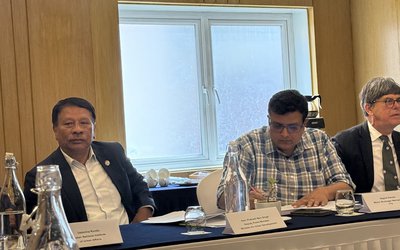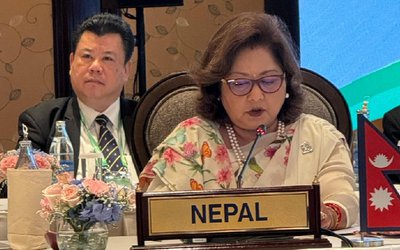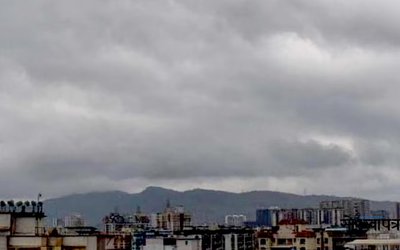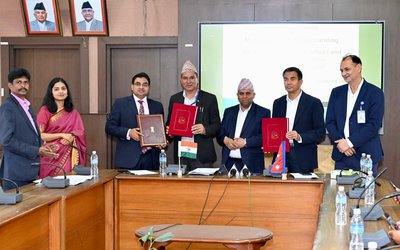The topic of this forum is a timely and critical one: labour migration has increasingly become part and parcel of daily life for many families, not only in South and Southeast Asia. Every day, hundreds of young men and women leave their homes and move abroad in search of a better future for themselves and their families. They exchange the familiarity of their own culture, traditions and social roots for an uncertain future in a foreign place.
Today, more countries are significantly involved in, and affected by, international migration than ever before in history. And it is no longer a straightforward task to differentiate between “countries of origin” and “countries of destination”. For this reason, the phenomenon of international migration today calls for a substantial discussion and consolidated action by Governments, the private sector and civil society alike.
On the one hand, the evidence on migration’s potential benefits is mounting. With their remittances, the global amount of money migrants from the developing world send back to their families exceeds the total of all international development assistance combined. As a matter of fact, it is estimated that remittances account for triple the amount of total ODA.
Especially in South Asia, migrant labour has strongly contributed to poverty reduction among migrants’ families over the last few decades. Nepal’s economic situation and development are inextricably linked to the phenomenon of labour migration to India, the Gulf emirates and other dynamic Asian countries. At present, remittances account for about 25 percent of Nepal’s gross domestic product.
And money is far from being the whole story. Migrants abroad are brain reserves for their countries. They use their skills and know-how to transfer technology and institutional knowledge upon their return. If managed properly, the returnees’ knowledge can help countries to meet their growth and development objectives. Migrants inspire new ways of thinking about social and political issues. Many migrants actively build bridges between their countries of origin and their countries of residence. They form a dynamic human link between cultures, economies, and societies.
However, there is no denial that labour migration also has a number of negative dimensions. More often than not, there is a high pressure to migrate because of conflict, poverty and a lack of alternative employment opportunities.
The majority of migrants are young people and their know-how and manpower is urgently needed in their home countries. In South Asia, the private and agricultural sector are struggling to cope with the consequences of the significant labour migration. A major consequence of this outflow of both skilled and unskilled people is the labour and skills shortages that many regional employers are now facing. Migration can also place a heavy burden on a migrant's family and the social tissue.
Above all, it is the migrants themselves who face a high risk. Many of them place themselves in the hands of dubious agencies and travel illegally to their destination. There is no guarantee that they will find work. In many cases, they find themselves largely deprived of basic rights. Their educational and vocational qualifications are often not recognised, leaving them with no option but to do low-paid temporary work instead of upgrading their knowledge and skills. Too often, migrants live in fear of being victimized as the so-called “other”, of having little recourse to justice, or of having their wages or passports withheld by an unscrupulous employer.
Given these stark realities, all the stakeholders need to work together, with courage and vision, to make migration work for the benefit of migrants and countries alike. This includes 1) securing migrants’ rights, 2) lowering the costs of migration and 3) fighting discrimination at all levels.
Parliamentarians do have a key role to play in bringing the voices of their constituencies – be it at home or aborad – to the decision-making process. In this regard, I believe the Asian Inter-Parliamentary Caucus on Labour Migration can foster practical, evidence-based cooperation among Governments. At the institutional level, closer cooperation between SAARC, ASEAN and the European Union is an aspect that merits further exploration.
Also for German foreign and development policy, migration is a pressing topic. Thus, the German Government integrates migration issues into development policies and aims at contributing to a situation in which migration benefits all the parties to become a ‘triple win’ – for the migrants themselves, for their country of origin, and for the country of destination.
Let me illustrate this point with two concrete examples of our work here in Nepal: 1) On behalf of the German Government, the Centre for International Migration and Development (CIM) has been implementing the Returning Experts programme in Nepal since 2010. This programme supports highly qualified and professional Nepalese willing to return and reintegrate in their home country. In the past three years, 50 returnees have been provided with professional equipment and advice.
2) Germany also supports projects of political foundations and private social organizations. In Nepal, the Friedrich-Ebert-Stiftung and AWO International deserve special mention. Both organizations have been stimulating policy-oriented debates on how to better manage labour migration and ensuring migrants’ access to fundamental rights.
Let me use this opportunity to compliment the Migrant Forum Asia and the Friedrich-Ebert- Foundation for their joint initiative in setting up this important conference.
I am convinced that this forum will offer a platform to exchange information, share ideas and experience and promote effective country practices related to labour migration. That this caucus is gathered here today, with such broad representation, is testimony to the great interest of parliamentarians in the region in this crucial issue.
Groth, is Chargée d’Affaires a.i., Germany Embassy Kathmandu. Excerpts of the statement delivered at a Conference on Advancing the Protection and Promotion of the Rights of Migrant Workers in Key Inter- Governmental Regional Processes Annual Meeting of the Asian Inter-Parliamentary Caucus on Labour Migration

Ms. Jacqueline Groth
Jacqueline is a Deputy Chief of the Mission of Embassy of Germany in Nepal
- Labour Migration
- Nov 23, 2014














